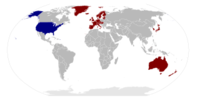-
U.S. geological carbon dioxide storage potential

The United States has the potential to store a mean of 3,000 metric gigatons of carbon dioxide (CO2) in geologic basins throughout the country. Technically accessible storage resources are those that can be accessed using today’s technology and pressurization and injection techniques. The most common method of geologic carbon storage involves pressurizing CO2 gas into a liquid, and then injecting it into subsurface rock layers for long-term storage.
-
-
U.S. ports vulnerable to cyberattacks
New study says that the U.S. largest ports are vulnerable to cyberattacks.The study argues that the level of cyber security awareness and culture in U.S. port facilities is relatively low, and that a cyberattack at a major U.S. port would quickly cause significant damage to the economy.
-
-
Growing cybersecurity opportunities for young Americans
With the growing number of cyberattacks on U.S. companies, government agencies, and critical infrastructure, and the likelihood that such attacks will only increase, there has been a corresponding increase in the number of cybersecurity programs and educational opportunities for young Americans.
-
-
Improving the reliability, resiliency of post-Sandy N.J. electric grid
According to NOAA, prolonged electrical outages, largely because of storms, have been steadily increasing in frequency since 1995. Sandia Lab will help East Coast communities devastated by Hurricane Sandy boost the resiliency of their electric grids, so they can be better prepared to deal with natural disasters in the future.
-
-
Increasing food production from existing farmland
A policy known as sustainable intensification could help meet the challenges of increasing demands for food from a growing global population. The goal of sustainable intensification is to increase food production from existing farmland. Sustainable intensification would minimize the pressure on the environment in a world in which land, water, and energy are in short supply.
-
-
New expert network to advice organizations on how to keep data safe
A new expert network which helps organizations safely manage and share sensitive data has been launched. The U.K. Anonymization Network (UKAN) will advise organizations and companies on how to minimize the risk that personal details of individual people are inadvertently revealed when data are used to create valuable services.
-
-
Senate immigration bill could yield billions in federal contracts
The Senate immigration bill will see billions of dollars go to defense and technology companies as a result of billions of dollars in new and expanded federal contracts aiming to bolster border security.
-
-
U.S. tax code has minimal effect on CO2, other greenhouse gas emissions
Current federal tax provisions have minimal net effect on greenhouse gas emissions, according to a new report from the National Research Council. The report found that several existing tax subsidies have unexpected effects, and others yield little reduction in greenhouse gas emissions per dollar of revenue loss.
-
-
NSA revelations raise doubts about passage of cybersecurity legislation
U.S. officials say the revelations about the National Security Agency’s(NSA) domestic surveillance programs could make it harder for lawmakers to pass a cybersecurity bill. Critics of the House cybersecurity bill, known as the Cyber Intelligence Sharing and Protection Act (CISPA), which was passed earlier this year (it is still being debated in the Senate), argued the bill could lead to private information falling into the hands of the NSA.
-
-
Lawmakers want to ease travel to U.S. as part of immigration legislation

A bi-partisan group of House lawmakers is working to include a provision in the House immigration legislation which will make it easier to travel to the United States. Travel industry groups support the effort, having fought for years to get the government to relax security measures. The industry has argued that these measures have turned off many foreigners from traveling to the United States.
-
-
Improving crop resilience, yields in a world of extreme weather
Farmers in the United States witnessed record-breaking extremes in temperature and drought during the last two summers, causing worldwide increases in the costs of food, feed and fiber. Indeed, many climate scientists caution that extreme weather events resulting from climate change is the new normal for farmers in North America and elsewhere, requiring novel agricultural strategies to prevent crop losses. UC Riverside-led research team develops new chemical for improving crop drought tolerance.
-
-
Rapid, on-site detection of illegal cooking oils

In recent years, illegal cooking oil incident in China caused serious food safety risks. Researchers have developed two rapid and convenient colorimetric detection methods of illegal cooking oils based on phase transfer technology.
-
-
FDA shuts down more than 1,500 online pharmacies

The U.S. Food and Drug Administration (FDA) and Interpol have shutdown 1,677 online pharmacies for selling counterfeit or substandard medication and selling drugs without the necessary safeguards.
-
-
Our farblondzhet senators

The Senate immigration reform bill has been presented as an effort to resolve the many complex problems resulting from the Immigration and Reform Act (IRCA) of 1986. Whether the bill passed by the Senate yesterday will succeed remains to be seen, but what is not in doubt is the fact that the border security provisions in the bill, in the words of Sen. Patrick Leahy (D-Vermont), read “like a Christmas wish list for Halliburton” and other big defense contractors. This is unfortunate, because the U.S.-Mexico border has become a graveyard for a long list of ambitious, technology-heavy – but ultimately ineffective and exceedingly wasteful – programs.
-
-
Renewables to surpass gas by 2016 in the global power mix: IEA

An International Energy Agency (IEA) report says power generation from hydro, wind, solar, and other renewable sources worldwide will exceed that from gas and be twice that from nuclear by 2016.
-
More headlines
The long view
Factories First: Winning the Drone War Before It Starts
Wars are won by factories before they are won on the battlefield,Martin C. Feldmann writes, noting that the United States lacks the manufacturing depth for the coming drone age. Rectifying this situation “will take far more than procurement tweaks,” Feldmann writes. “It demands a national-level, wartime-scale industrial mobilization.”
Trump Is Fast-Tracking New Coal Mines — Even When They Don’t Make Economic Sense
In Appalachian Tennessee, mines shut down and couldn’t pay their debts. Now a new one is opening under the guise of an “energy emergency.”
Smaller Nuclear Reactors Spark Renewed Interest in a Once-Shunned Energy Source
In the past two years, half the states have taken action to promote nuclear power, from creating nuclear task forces to integrating nuclear into long-term energy plans.
